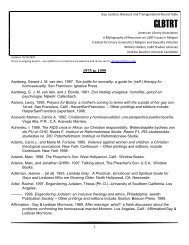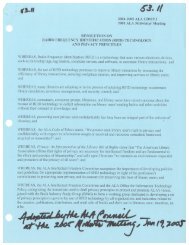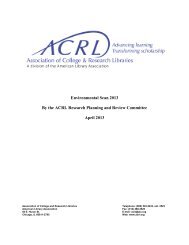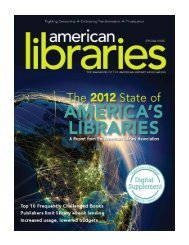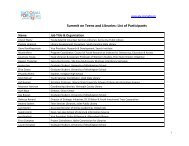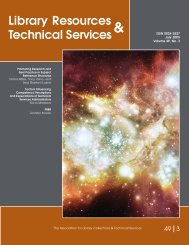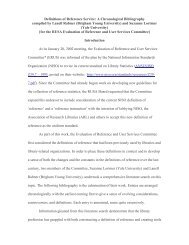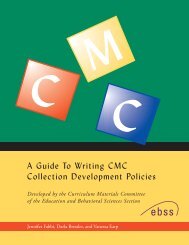The Campaign for America's Libraries - American Library Association
The Campaign for America's Libraries - American Library Association
The Campaign for America's Libraries - American Library Association
You also want an ePaper? Increase the reach of your titles
YUMPU automatically turns print PDFs into web optimized ePapers that Google loves.
5. Why should I be a librarian?/ Why would I want to work <strong>for</strong> a profession that is poorly paid?<br />
Being an academic librarian is extremely rewarding. <strong>The</strong> salary is comparable to what many faculty<br />
make and continues to rise. But the real pay off is the satisfaction you get from helping students learn<br />
important research skills, empowering them with lifelong learning skills, and assisting researchers in<br />
work that is important to society. For many of us who choose librarianship as a second career, working in<br />
a college library allows us to use our skills and knowledge in new and different ways. As a profession,<br />
librarians are committed to ensuring that in<strong>for</strong>mation is freely available and to collecting and preserving<br />
resources of value to tomorrow’s researchers.<br />
6. Why should the library get more money when we are having to cut back other departments?<br />
<strong>The</strong> library is essential to a learning community. It provides a wealth of resources—both traditional<br />
print resources and advanced technology—that students, faculty, and researchers could not otherwise<br />
af<strong>for</strong>d or have access to. <strong>The</strong>se resources support teaching and learning across all departments. More<br />
importantly, our librarians are partners in teaching students critical research skills, developing curricula,<br />
and assisting researchers in important and innovative research projects. In the last five years, our library’s<br />
buying power has decreased by [add number here] percent. Without an increase, we cannot provide the<br />
quality or quantity of resources that our faculty and students deserve.<br />
7. Since everything is electronic, shouldn’t the library need less money?<br />
Technology offers many advantages, but saving money isn’t necessarily one of them. Technology is<br />
not cheaper. Most electronic journals and reference works cost as much—if not more—than print<br />
editions. <strong>The</strong>y also require computers, software, and other technology that must be maintained, updated,<br />
and staffed. While technology is expensive, it makes in<strong>for</strong>mation retrieval faster and easier and provides<br />
the state-of-the-art access that today’s students and researchers expect. Our library houses important<br />
archives of historical documents, photographs and recordings, as well as print materials—the vast<br />
majority of which are not available on the Internet. This will be true <strong>for</strong> the <strong>for</strong>eseeable future.<br />
8. What is “in<strong>for</strong>mation literacy” anyway?<br />
In<strong>for</strong>mation literacy means knowing how to find, evaluate, and effectively and responsibly use<br />
in<strong>for</strong>mation from a variety of sources. It means knowing when a book may be more helpful than a Web<br />
site or when a website may be more up to date than a book. It means knowing what questions to ask. Is<br />
the in<strong>for</strong>mation complete? Accurate? Is someone trying to sell something? Good decisions depend on<br />
good in<strong>for</strong>mation. Academic librarians teach 21st century research skills that students will use throughout<br />
their professional and personal lives.<br />
9. Why are librarians concerned about in<strong>for</strong>mation literacy?<br />
Lbrarians know that having more in<strong>for</strong>mation isn’t necessarily better and that the best source of<br />
in<strong>for</strong>mation isn’t always Google. Good decisions depend on good in<strong>for</strong>mation. Librarians know that<br />
in<strong>for</strong>mation literacy is a survival skill in the 21st century. <strong>The</strong>y also know that <strong>for</strong> knowledge to advance,<br />
it must be based on the best, most current in<strong>for</strong>mation.<br />
<strong>The</strong> Big Picture: Issues<br />
Academic and research librarians are committed to the free flow of in<strong>for</strong>mation that fuels higher learning<br />
and research in a democratic society. <strong>The</strong> following are among the top issues identified by the ACRL<br />
Focus on the Future Task Force. <strong>The</strong>se issues can provide a national context <strong>for</strong> story ideas that you may<br />
wish to share with the media, use in presentations, or discuss in <strong>for</strong>ums. For statistics on academic and<br />
research libraries, their services, use, and funding and studies on academic libraries and the impact of<br />
10



